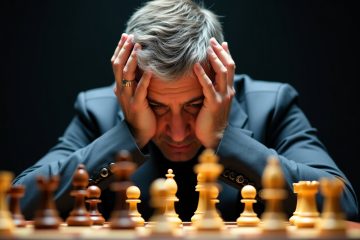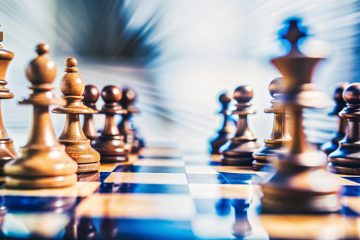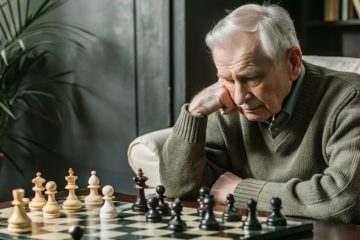Master Emotional Control Through the Power of Chess
The power of chess goes far beyond strategy and competition. While many recognize chess as a game that sharpens the mind, it also serves as a powerful tool for emotional development. By engaging in the intricate thought process required in chess, players naturally develop greater control over their emotions. This mastery not only improves game performance but also enhances emotional intelligence, patience, and stress management in everyday life.
Emotional control through the power of chess can be transformative. The lessons learned on the chessboard—such as handling pressure, maintaining focus, and bouncing back from defeat—apply directly to real-life challenges. As players navigate complex positions and anticipate their opponent’s moves, they cultivate emotional resilience and strategic thinking, enabling them to manage stress, control impulses, and remain composed in difficult situations. In this article, we’ll explore how chess can help you master emotional control and experience personal growth both on and off the board.
- How does chess help with emotional control?Chess helps develop emotional control by teaching players to remain calm under pressure, manage their impulses, and think strategically. The game requires patience and emotional discipline, which translates into better emotional management in real-life situations.
- What life skills can be gained from emotional control through chess?Chess enhances several life skills, including emotional resilience, patience, critical thinking, and self-reflection. These skills are essential for managing stress, overcoming challenges, and improving emotional intelligence.
- Can chess help control impulsive behavior?Yes, chess helps curb impulsivity by encouraging thoughtful decision-making. Players must carefully consider each move, which teaches them to pause, reflect, and manage their emotions before acting, a skill that translates well into real-world situations.
- How does chess promote emotional resilience?Chess teaches emotional resilience by helping players cope with defeat and learn from their mistakes. Reflecting on losses and strategizing improvements helps build the emotional strength to face challenges with a positive and growth-oriented mindset.
Emotional Discipline
Chess teaches emotional discipline in that it makes players think analytically-not impulsively. Every move in chess has repercussions, and unless the player keeps calm and makes conscious decisions no matter the height of the game, he cannot expect success. The same happens in real life: anyone who faces adverse situations needs to be strong enough that emotional factors do not blind his judgment. Learning to manage emotions with chess means not being absolutely overrun by feelings in the approach to a problem.
One of the useful things one can get accustomed to while playing chess is taking the time to think about most, if not all, of the moves one decides to make by considering some of the short- and long-term implications. Of course, this can quite easily be applied to everyday life in encouraging one to slow down emotionally laden reactions into thoughtful responses.
- Practical Tip:
Stop and reflect on both shortand long-term effects before making a move. Bring this practice into life when, during an emotionally charged situation, one takes time to think before responding.
Patience and Emotional Endurance
Chess teaches patience salient for emotional control. It is a slow game and requires sustained concentration; hence, it teaches individuals how to stay calm and collected for a long time. When an opponent becomes aggressive or the game gets complicated, emotional balance must be maintained. Patience, as derived from chess, goes beyond the board and enables one to handle stressful situations gracefully.
Make time for chess; the game will help you build up emotional endurance. Never press yourself for speedy decisions during the game. Take your time and relish every moment; afterward, it will give you the patience of a saint facing life’s stresses.
- Practical Tip:
Consider the slowness of chess as an opportunity to practice patience. While playing the game, do not rush into making any decision; instead take a while to consider all possibilities. This very aspect can later help you in developing emotional stamina for other aspects of life too in which one often suffers from problems related to work or stressors in personal life.
Emotional Resilience Through Defeat
Learning to lose graciously is part and parcel of emotional development through chess. Nobody always wins a game, and these losses can be upsetting. Conversely, reflecting on mistakes and using them as learning opportunities builds emotional resilience. Chess teaches players that their failures are not the end but opportunities for improvement-a serious mindset in life.
Instead of dwelling on your negative feelings following a loss, reflect on those mistakes that brought about the defeat. It can also be useful in life for those moments when personal setbacks need to be reflected upon for emotional resilience.
- Practical Tip:
When you lose a game in chess, instead of sulking, you think about where the mistake happened and why the defeat was caused. Apply this to your life when you face a setback, be it personal or professional. It builds resilience because you end up focusing on what needs improvement, instead of engaging in negativity.
Emotional Intelligence and Strategic Thinking
Chess is a game about strategy, but it’s also about reading your opponent’s mental state. Knowing when opponents feel they are on the hot seat or are overconfident helps one predict their moves and course-correct their strategy. Given that reading such emotions develops an inherent sense, it refines emotional intelligence-one that plays a very important role in social settings and relationships.
In any game, paying attention to the behavior of your opponent actually helps get an idea of his or her state of mind-the skill which is useful to have outside the chess game too. Being able to read others emotionally and to make active responses is one of the important components of emotional regulation and interpersonal skills.
- Practical Tip:
While you are playing, pay attention not only to the moves but also to your opponent’s behavior and body language. This can give you certain views about their emotional state. Later on, having applied all this in real-life situations will help you estimate others’ feelings more precisely and treat them with much more empathy.

Stress Reduction and Emotional Balance
Chess is a form of psychological relaxation that helps an individual maintain emotional balance. The depth of focus on the game removes players from the painful everyday reality and, as such, helps reduce anxiety. Intellectual tension for chess provides a field of effective spender of emotional tension, leading to a more calm and emotionally balanced state.
Regular playing of chess can reduce stress and sharpen emotional clarity. A game is a kind of diversion from stressful stimuli and helps return to emotional equilibrium.
- Practical Tip:
Make chess a part of your daily routine, as chess is good mental relaxation. Playing will make you shift your focus from stressors to the game and reload your energy so you have a fresh, clear mind to handle those challenges.
Controlling Impulsivity and Managing Anger
Chess teaches one that impulsive decisions often lead to mistakes-a parallel lesson that applies to life as well. A chess player learns to control their emotions, suppress the cause of an impulsive reaction, and make reasoned decisions. Such control during everyday life is very valuable when managing feelings of frustration or anger.
Deep breathing helps in calming the nerves and reduces impulsivity in emotionally charged situations-a technique that could be honed from chess into real life.
- Practical Tip:
Practice deep breathing during emotional moments in a game; this could help cultivate nerves and reduce impulsivity. Over time, this technique can also be applied during real-life situations that require emotional control.
Focus and Emotional Distraction
Chess is a game that requires a lot of concentration; the slightest emotional disturbance may occur when fluctuations in performance take place. With the improvement of the ability to focus, players learn how to minimize emotional influences when making their decisions about a game. Another important aspect of this training is very crucial in other spheres of life whenever a person is expected to stay focused even in the midst of emotional storms.
You will be able to center yourself in situations, such as playing chess, by being mindful of the present moment and current game in front of you. These could then be applied to more “real-life” situations when emotional distractions may throw you off your focus.
- Practical Tip:
Practice being in the present moment in a game by setting all attention on the chessboard and the next move alone. Similarly, when emotional triggers come in life, do the same-narrow your focus to only the task at hand and banish external stimuli that may provoke emotions.
Emotional Growth Through Self-Reflection
Chess is a mirror to the mind, reflecting not only strategic thinking but also emotional responses. After a game, self-reflection about how your emotions may have influenced your decisions provides a powerful means of emotional growth. This practice will help you find the emotional triggers and provide insight into how they can be better managed in the future to ensure more self-awareness.
A few moments of reflection after a game may bring out some really interesting responses from an emotional point of view. Were you impatient or frustrated? Understanding such patterns leads to growth in both chess and life.
- Practical Tip:
After each chess game, take a minute or two to reflect on how your emotions may have influenced your play. Were you impatient? Did frustration cloud your judgment? Use this insight to identify any patterns in your emotional responses and work on improving those in the next game—and in life.

Conclusion
The power of chess extends far beyond the game itself. It is not just about making the right moves but about mastering your emotions along the way. Through the challenges and triumphs of chess, players develop the ability to stay calm under pressure, think critically, and manage their emotional responses. This game teaches valuable life skills such as patience, emotional endurance, and resilience, which can transform how you handle real-world stressors. By consistently engaging with chess, you cultivate emotional intelligence and strategic thinking that elevate your mental well-being.
By embracing emotional control through the power of chess, you unlock a deeper level of self-awareness and emotional growth. Each match becomes a reflection of your inner emotional landscape, offering opportunities for self-reflection and improvement. Whether you’re looking to manage stress, improve focus, or build resilience, chess provides the perfect arena for honing these essential life skills. Incorporate chess into your daily routine and experience how this ancient game can guide you towards a more emotionally balanced and empowered life.
If you’re interested in diving deeper into this topic, we’ve prepared a podcast just for you. Feel free to listen and explore more insights:
References:
- Sala, P., Gobet, F., Campitelli, G., & Hambrick, D. Z. (2017). “The relationship between chess and academic achievement: A meta-analysis.” Review of Educational Research, 87(3), 505-536.
- Burgoyne, A. P., et al. (2016). “The relationship between chess skill and cognitive ability: A systematic review.” Intelligence, 57, 43-49.
- Rios, J., & Munoz, A. (2019). “Teaching chess to children: Effects on cognitive and emotional development.” Journal of Educational Psychology, 111(2), 350-362.
- McKeen, K. (2017). “Chess: A tool for learning and personal growth.” International Journal of Educational Research, 8(4), 200-210.
- Hsu, Y. Y. (2015). “The cognitive benefits of chess: A review of the literature.” Educational Psychology Review, 27(4), 545-565.
- Leikin, R., & Zazkis, R. (2018). “Mathematical creativity and mathematical thinking: The role of chess.” Educational Studies in Mathematics, 97(1), 1-16.
- Cormier, R. (2017). “Chess and mental health: How playing the game can improve your well-being.” Psychology Today. Retrieved from psychologytoday.com.
- Liu, J., & Zhang, Q. (2020). “The effects of chess on the cognitive and emotional development of children.” Journal of Child Psychology and Psychiatry, 61(2), 132-139.
- Campbell, J. (2018). “The emotional benefits of playing chess: Developing resilience through the game.” Mindfulness and Mental Health, 10(3), 245-260.
Recommended Articles:
- Psychology and Controlling Stress & Emotions in Chess
- The Power of Chess: The Benefits of Playing Chess



0 Comments